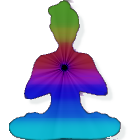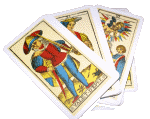
Haindl Tarot
FIVE OF SWORDS - DEFEAT
NEW TITLE: "SENSELESS FIGHTING"
I CHING: 47, K'UN, "OPPRESSION"
REVERSED I CHING: 48, CHING, "THE SOURCE"
In most Tarot decks the Five of Swords is one of the most difficult cards. The idea of defeat can apply to many things beyond the narrow concept of a battle and a loss. It can mean the defeat of hope, of ambitions. In a wider sense the card symbolizes the defeat of nature through human destruction. In such a defeat there are no winners. This is partly why Haindl gave the picture its new title, "Senseless Fighting." In the world at large, or in personal relationships, when people begin to fight just for the sake of fighting, pride, or resentment, only destruction can follow. The terrible attacks on American buildings and people that occurred in September 2001 seemed incomprehensible to many people. "Why would anyone do this?" people asked each other. And the villagers who suffered under U.S. retaliation, who had nothing to do with Al-Qaeda or the Taliban, asked the same question.
Notice that the perfect swords of the Allemannen have all broken. Among other things, the swords represent modern technology. If we bring about a genuine collapse through global warming and other dangers, then the technology that produced the disasters will end up falling apart as well.
The I Ching hexagram, number 47, provides a slightly more positive outlook. Wilhelm titles it "Oppression" and Wing "Adversity." The commentary tells us that the negative lines hold down the positive. Despite the bad situation, however, Wilhelm says that cheerfulness and perseverance will bring success. If the person remains stable in himself or herself and steadfast in goals, this can overcome fate. Wing, too, recommends "dedication and courage." He says as well that the individual should give in to the mood of the times. This idea is a very important one. In several hexagrams the I Ching says the opposite. We cannot oppose the general tendencies and must retreat or wait until the moment changes to something lighter. But here we learn that the individual can take action, can change the situation.
Reversing the hexagram gives us 48, the Source. We see this joyous hexagram on the Ten of Stones. Here it tells us that defeat is not final. We can reverse disaster if we trust the source of life.
The picture comes from the painting of a dying unicorn. The unicorn is an ancient image that signifies an ancient part of humanity, one that goes back to a time of greater respect for the Earth and for spiritual awareness. The animal shows its teeth but there is no aggression here, for the unicorn does not eat meat and the teeth are not sharp. The unicorn symbolizes gentleness.
Symbols that represent hope or joy in other cards here become turned around. In the suit of Cups the blue sky represented peace. Here the blue sky takes on a metallic, pitless quality. In many other cards bubbles or balls symbolize new life. Here blood taints the bubble with pain.
In the midst of such negativity we need to remember that this card represents only one vision of the world. We should remember, too, that Tarot cards, unlike I Ching hexagrams, do not appear alone in readings. The other cards around the Five of Swords may move the meaning in different directions.
DIVINATORY MEANINGS
In readings, the card shows a situation that can overwhelm the person. The person may feel powerless to do anything. Attempts to bring change may seem, at least at first, to go nowhere. But the hexagram tells us that we should not give in to despair. If we persist in doing what we can, if we hold to our principles and beliefs, we eventually will see a change.
REVERSED
In some Tarot decks, the reversed Five of Swords remains pessimistic, emphasizing the shame that a person feels when defeated. Because the Haindl version includes the idea of courage and persistence, the reversed card would suggest that the situation has begun to turn around. The reversed hexagram reminds us to turn to spiritual sources of nourishment in order to escape cycles of useless fighting. These meanings would become emphasized with positive cards of renewal, such as the Star, but also with cards of courage, such as the Chariot.
K'OEN - de benauwenis (de uitputting)
HET OORDEEL
De Benauwenis. Welslagen. Standvastigheid.De grote man bewerkt heil. Geen blaam.
Als men iets te zeggen heeft, wordt men niet geloofd.
HET BEELD
In het meer is geen water: het beeld van de Uitputting.Zo zet de edele zijn leven op het spel,
Om zijn wil te volgen.










